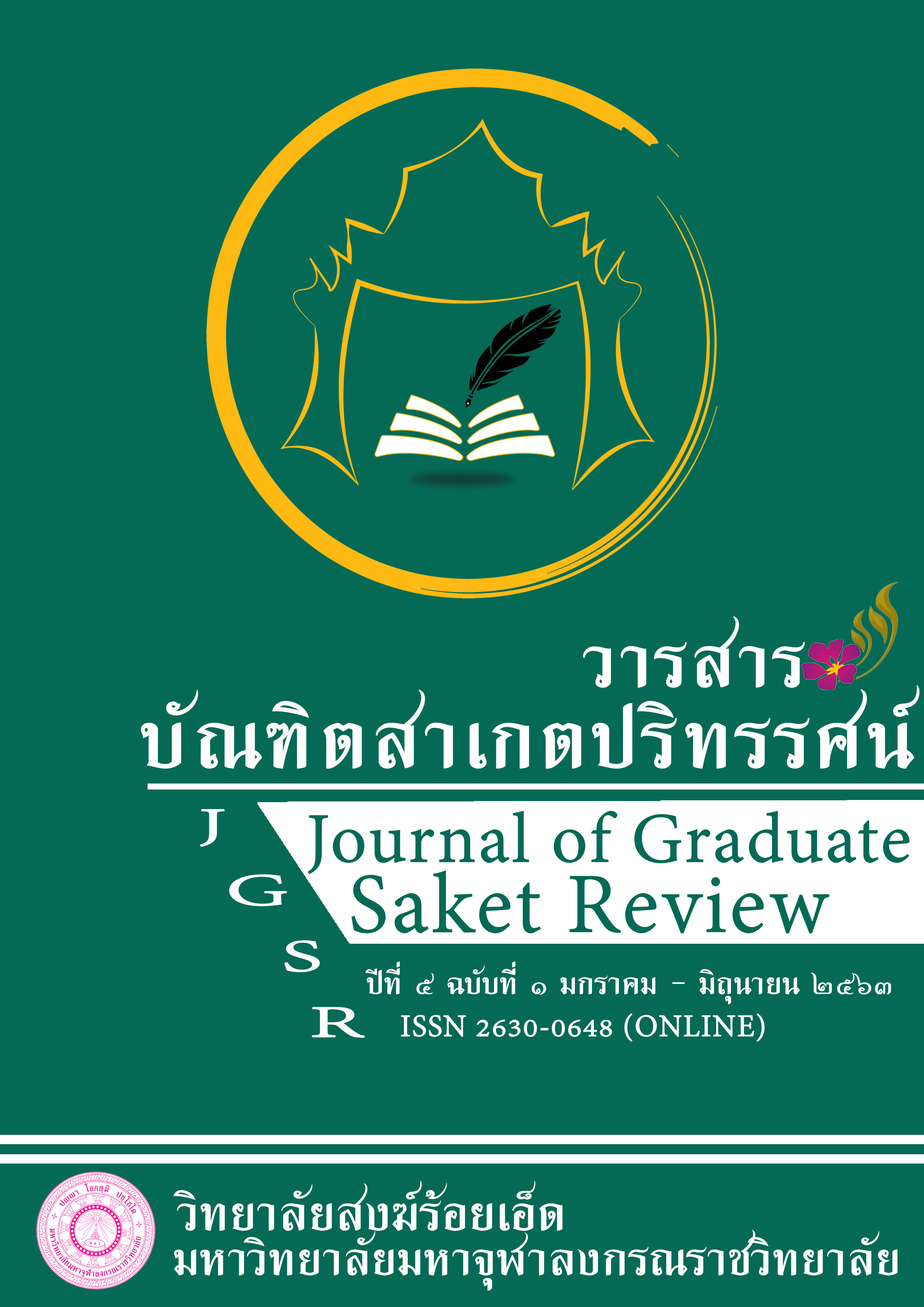แนวทางการส่งเสริมสุขภาวะในพระพุทธศาสนา ตามแนวทางพุทธเถรวาท
Main Article Content
บทคัดย่อ
งานวิจัยนี้ เป็นการวิจัยเชิงคุณภาพ (Qualitative Research) มีวัตถุประสงค์ ดังนี้ 1) เพื่อศึกษาธรรมโอสถที่ปรากฏในพระพุทธศาสนาเถรวาท 2) เพื่อศึกษาสุขภาวะในพระพุทธศาสนาตามแนวทางพุทธเถรวาท และ 3) เพื่อนำเสนอแนวทางการส่งเสริมสุขภาวะในพระพุทธศาสนาตามแนวทางพุทธเถรวาท
ผลการศึกษาเชิงปริมาณพบว่า
สุขภาวะตามแนวพระพุทธศาสนา คือ ความสุขที่เกิดจากธรรมชาติ ความสงบสุข ความสบายใจ ประกอบด้วย สุขภาวะทางร่างกาย และจิตใจ ประกอบด้วย 1. การพัฒนากาย (พัฒนาอินทรีย์ 6) การพัฒนาจิต (จิตภาวนา) และการประพฤติธรรม เพื่อแก้ไขปัญหาด้าน สังคมในการอยู่ร่วมกัน ปัญหาด้านเศรษฐกิจและรายได้ประพฤติปฏิบัติ เพื่อความดี ความถูกต้องทั้งทางกายและจิตใจ ซึ่งเป็นพัฒนาคุณภาพชีวิตให้สามารถอยู่ในสังคมได้เป็นปกติ สามารถนำหลักพุทธธรรมมาใช้ในการดำเนินชีวิตได้อย่างมีความสุขและเหมาะสมกับตนเอง
แนวทางการส่งเสิรมสุขภาวะตามแนวทางพระพุทธศาสนาเถรวาท คือ การพัฒนาคุณภาพชีวิตซึ่งในทางพระพุทธศาสนา คือ การแก้ปัญหาชีวิตโดยใช้แนวทางกายภาพที่เกื้อกูลและได้ผลดีในการดำเนินชีวิต เพื่อความแข็งแรงสมบูรณ์ของร่างกาย และจิตใจ โดยการใช้หลักธรรม ประกอบด้วย ดังนี้ สติปัฏฐาน 4 อิทธิบาท 4 โพชฌงค์ 7 มรรคมีองค์ 8 สมาธิ สัญญา 10 ไตรลักษณ์ พรหมวิหาร 4 สำหรับหลักดังกล่าวสามารถสัมพันธ์กับโลกภายนอก ในการส่งเสริมพัฒนาร่างกาย และจิตใจให้มีความแข็งแรงสมบูรณ์ทุก ๆ ด้าน หรือการปราศจาก ความเจ็บป่วย นอกจากนั้นยังเป็นการพัฒนาส่งเสริมคุณภาพชีวิตควบคุมความพฤติกรรมที่ดีงามในความสัมพันธ์กับเพื่อนมนุษย์ โดยตั้งอยู่ในวินัยในการพัฒนาหรือฝึกตนเอง ให้หลีกเว้นโทษทางกาย และวาจา ส่งผลต่อการอยู่ร่วมกันในสังคม ส่วนในด้านจิต ก็จะทำให้เกิดความดีงามมีความอดทน เพราะเมื่อพบปัญหาทางด้านอารมณ์ ก็สามารถควบคุมอารมณ์ได้ดี และจะทำให้เกิดปัญญา เกิดความรู้ ความคิด ให้เข้าใจกับปัญหาสามารถแก้ไขปัญหาต่าง ๆ ได้ด้วยปัญญา แนวทางการส่งเสริมสุขภาวะตามแนวทางพระพุทธศาสนาเถรวาท จึงพอสรุปออกได้ ดังนี้
- 1. กายภาวนา การดูแลสุขภาพ ร่างกายให้มีความแข็งแรงสมบูรณ์และปราศจากความเจ็บป่วย รวมถึงการใส่ใจดูแลสิ่งแวดล้อมภายนอกได้ อย่างถูกต้องเหมาะสมดีงาม เพื่อให้เกิดประโยชน์ และสิ่งอื่น ๆ ที่จำเป็นต่อการดำรงชีวิตผู้สูงอายุให้เกิด ความสุข
- 2. ศีลภาวนา การพัฒนาเจริญศีลด้านความประพฤติให้ดีขึ้น มีระเบียบวินัย ไม่เบียดเบียนผู้อื่น ดำเนินชีวิต เป็นศีลเบื้องต้น เมื่อนำมาประพฤติปฏิบัติเพื่อมุ่งสู่การไม่เบียดเบียน ทั้งทางกาย และวาจา ไม่สร้างความเดือดร้อนให้กับ สังคมให้ความเกื้อกูลต่อสังคม มีระเบียบวินัยอยู่ร่วมสังคมอย่างมีประโยชน์สุข
- 3. จิตภาวนา การพัฒนาจิต ให้เข้าใจความเป็นจริงของชีวิต เมื่อมีจิตที่มั่นคงแน่วแน่สามารถรู้ทันต่อเหตุปัจจัย ย่อมดำเนินชีวิตไปในทางที่ถูก
- 4. ปัญญาภาวนา การพัฒนาฝึกอบรมปัญญา ให้มีความรู้ความเข้าใจในสิ่งทั้งหลายเป็นไปตามความ เป็นจริง การรับรู้ในหลักธรรมชาติของสรรพสิ่งที่เกิดขึ้น สามารถใช้ปัญญาพิจารณาเหตุแห่งปัจจัยที่เข้ามา กระทบ ใช้ปัญญาไตร่ตรองยึดมั่นในหลักของคุณธรรมและจริยธรรมมองเห็นหลักของเหตุและผล
Article Details
เนื้อหาและข้อมูลในบทความที่ลงตีพิมพ์ในวารสารบัณฑิตสาเกตปริทรรศน์ ถือเป็นข้อคิดเห็นและความรับผิดชอบของผู้เขียนบทความโดยตรงซึ่งกองบรรณาธิการวารสาร ไม่จำเป็นต้องเห็นด้วย หรือร่วมรับผิดชอบใด ๆบทความ ข้อมูล เนื้อหา รูปภาพ ฯลฯ ที่ได้รับการตีพิมพ์ในวารสารบัณฑิตสาเกตปริทรรศน์ ถือเป็นลิขสิทธิ์ของวารสารบัณฑิตสาเกตปริทรรศน์ หากบุคคลหรือหน่วยงานใดต้องการนำทั้งหมดหรือส่วนหนึ่งส่วนใดไปเผยแพร่ต่อหรือเพื่อกระทำการใด ๆ จะต้องได้รับอนุญาตเป็นลายลักอักษรจากวารสารบัณฑิตสาเกตปริทรรศน์ ก่อนเท่านั้น
เอกสารอ้างอิง
สุจิตรา อ่อนค้อม. (2554). ตอบปัญหาสนทนาธรรม ชุดรู้อย่างนี้ทำความดีตั้งนานแล้วเรื่องศาลาธรรม โอสถ 1. พิมพ์ครั้งที่ 7. กรุงเทพฯ : หอรัตน์ชัยการพิมพ์.
พระธรรมปิฏก (ป.อ. ปยุตฺโต). (2546). พระไตรปิฏก : สิ่งที่ชาวพุทธต้องรู้. พิมพ์ครั้งที่ 4. กรุงเทพฯ : เอส. อาร์. พริ้นติ้งแมส โปรดักส์.
พระมโน เมตฺตานนฺโท (น.พ. มโน เลาหวณิช). ธรรมโอสถ. สืบค้นเมื่อ 12 ม.ค.2557, จาก http://www. mettanando.com.


